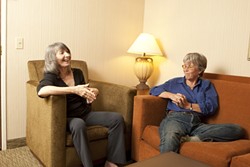[
{
"name": "Promo Temp Targeted",
"id": "PromoTempTargeted",
"class": "inlineCenter",
"insertPoint": "4",
"component": "15511697",
"requiredCountToDisplay": "0"
},
{
"name": "Ad - Medium Rectangle CC01 - 300x250 - Inline Content",
"class": "inlineCenter",
"insertPoint": "8",
"component": "15582119",
"requiredCountToDisplay": "12"
},{
"name": "Ad - Medium Rectangle LC01 - 300x250 - Inline Content",
"class": "inlineCenter",
"insertPoint": "18",
"component": "15582122",
"requiredCountToDisplay": "22"
},{
"name": "Ad - Medium Rectangle 9 - 300x250 - Inline Content",
"class": "inlineCenter",
"insertPoint": "28",
"component": "15582121",
"requiredCountToDisplay": "32"
}]
Linda Poelzl has been working as a professional surrogate partner for 17 years. What that means is frequently misunderstood.
Poelzl, who lives in San Francisco, works with a sex therapist to help clients overcome sexual issues. But where a sex therapist’s work is psychological, Poelzl’s is physical, employing exercises focused on intimacy, body image, relaxation, and the giving and receiving of touch. Sexual intercourse with clients is a minor part of Poelzl’s work—and also the most controversial, even among sex therapists.
But Poelzl’s work has been getting some positive new publicity in the wake of the new film The Sessions, based on the real-life experiences of Poelzl’s colleague, surrogate partner Cheryl Cohen Greene, and severely disabled journalist and poet Mark O’Brien. Paralyzed by polio since childhood and living in an iron lung, O’Brien (portrayed in the film by John Hawkes), contacts Greene (played by Helen Hunt), seeking to lose his virginity. The feel-good tale, which hits theaters in San Luis Obispo Nov. 8, has shone a light on the power of surrogate partners to help people overcome sexual challenges, thereby giving them a new sense of happiness and confidence in other areas of their lives.
Despite occasionally being rediscovered by the media, surrogate work is not yet widely known. The Sessions is about the biggest thing that’s happened to the field yet, and Poelzl and her colleagues hope the film will lead to better understanding of a rather delicate and unique field.
Some people refuse to differentiate what Poelzl does from prostitution, she said. Yet as she and her colleague, Los Osos sex therapist Jill Denton, explained, their intention is quite different; namely, a surrogate seeks to heal. After each session, Poelzl relates her findings to the client’s therapist, who is then better able to assist the client through a host of challenges.
“For men, it’s rapid ejaculation, formerly known as premature ejaculation,” Poelzl told New Times, ticking off common problems. “Delayed ejaculation, where some men have problems actually ejaculating in the vagina. Inexperience. I have a client right now who is 32 and has never, until recently, held hands, kissed a girl, had sex. He’s a gorgeous guy! People all around us have problems. People who you think, ‘Oh god, what an ugly person,’ could be having the best sex life in the world. So there’s a lot of people around who are silently suffering.”
For women, Denton adds, issues more often center on not feeling “good enough” or “attractive enough.” She also cites social anxiety and post-traumatic stress as common causes of sexual issues in both genders.
“When I first got started as a therapist, I was actually working with post-traumatic stress,” Denton said. “I had been sexually assaulted myself when I was in my mid-20s. This person intended to kill me. I managed to get away. But I couldn’t find anybody in Los Angeles who could help. And this was in the mid-’70s. I couldn’t find anyone to help with post-traumatic stress, which I was having. I couldn’t even go back to the house I was living in, because he broke in.”
Denton became a licensed therapist to help people with problems similar to her own. She worked for Santa Barbara’s Rape Crisis Center for the next seven years.
“I was working with women and men who had been sexually assaulted. And at that point, I started making a connection that this was affecting their relationships, and I really wanted to learn how I can help people sexually,” she explained. “I was finding out that people who have been traumatized began to have problems with sexual addiction.”
Once the Internet became popular, Denton began treating clients with addictions to online porn. In the early 2000s, she became certified as a clinical sexologist, or sex therapist. It was during her training that she learned about the work of surrogate partners.
Denton was introduced to Poelzl through Cohen Greene herself, and the two have been working together for the past six months.
When working with a client, Poelzl explained, her approach is gradual, with the first three sessions devoted to getting acquainted, discussing issues, and building a rapport. If the client wants to proceed from there, Poelzl explained, they usually begin with a few relaxation exercises, as well as some exercises in touch using a technique called sensate focus.
“It’s about really learning how to give and receive touch,” said Poelzl, who is bisexual and occasionally works with women as well as men. “I’m going to touch you, and you’re just going to relax and feel and enjoy it, and then we’ll check in at the end. And that’s usually like hands and face and maybe a foot rub—the first couple sessions with clothes on, usually. And sometimes if the client is ready and I’m ready, we might take clothes off in the third session. We’ll do an exercise called Body Image, usually in front of a full-length mirror. We’ll talk about our bodies. … A lot of the nudity is desensitization, which isn’t a negative thing. It means, for some people nudity is very charged. It’s more about being comfortable with each other nude before we get right in to being sexual.”
Poelzl will generally dedicate a few sessions to touch before moving on to a session she dubs “the sexological.”
“We answer questions. I talk about condoms and safe sex. Then we usually get into bed. I’ll offer him a look at my vulva. I even have a speculum, if they want to look inside.” She laughed. “It’s not exactly like what you would do on a date, but it’s probably something you’ll never have an opportunity for. I like men to know what their penis is touching inside. And then I ask them about their bodies, and how they like to be pleasured. After that, it pretty much gets into whatever their dysfunction is, or their problem. If they have rapid ejaculation, we do exercises to work on control and awareness. Then we focus on whatever the problem is—the challenge. And then on to intercourse or oral sex or whatever, if that’s in line with what the client needs to learn, and often it is. A lot of times people think it’s all about fucking, and it’s not. It’s a small part. Usually by the time they’re ready to do a lot of that, they don’t really need me any more.”
“What if the client falls in love with you?” is a question Poelzl frequently receives.
Of course there can be attraction, she conceded. But that’s where therapists like Denton come in, able to help the client with those feelings. If anything, Poelzl said, it’s a good sign if the client is able to form a bond with the surrogate—it means that the client is capable of falling in love with future partners out in the real world.
“It’s complicated,” Poelzl admitted. “It’s not an ideal situation. But it’s better than someone not being able to sort of practice that in a safe, caring, loving, supportive environment.”
“It’s intimacy work,” Denton added. “People are wanting the experience, the orgasm, without the relationship, without the intimacy. And so the work that Linda’s doing, in conjunction with the work that I’m doing, it’s invaluable.”
Arts Editor Anna Weltner can be reached at [email protected].
Latest in News
Readers also liked…
-

SLO police identify alleged driver who hit and killed couple
Dec 22, 2022 -

When the levee breaks: Oceano residents, county officials walk a tightrope of regulations to manage Arroyo Grande Creek, which some say led to the levee's failure in January
May 18, 2023 -

Cal Poly report highlights offshore wind's potential to spur green energy transition
Jun 8, 2023









